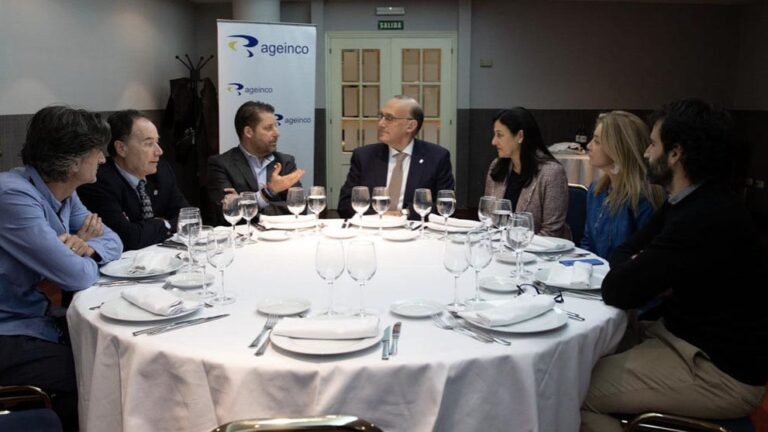The rector of the University of Vigo, Manuel Reigosa, has been invited to the AGEINCO Tribune held on Tuesday, December 10, in the Business Circle of Vigo. The meeting was marked by the signing of the collaboration agreement between both institutions, an agreement that had been working for months and that represents a fundamental axis in the future of the engineering sector in Galicia.
For his part, Daniel Prieto said in the Tribune, which was attended by partners, members of the board of AGEINCO and the General Secretary, Marta Gallego, the position of the Association regarding the need to create an agreement between the Association and the University of Vigo for its ability to establish synergies between the two that strengthen the sector in Galicia. “It is helpful for everyone, for the training of students and for the competitiveness of the private sector. It is an agreement that benefits society, ”he said.
For his part, Daniel Prieto has expressed AGEINCO’s position regarding the need to create an agreement between the Association and the University of Vigo for its ability to establish synergies between the two that strengthen the sector in Galicia. “We have the will and the ability to offer interesting proposals to the university in different fields, such as our vision on the adaptation of the agenda to a very changing professional reality, or the role of companies in the practical and continuous training of students,” he said Daniel Prieto, a supporter of the early incorporation of students to the dynamics of the private professional field taking into account determining factors such as specializations or production volumes.
Manuel Reigosa was accompanied by the signing of the agreement the Vice Chancellor for Research, Belén Rubio, and the Vice Chancellor for Planning and Sustainability, José Luis Míguez. Both put on the table the possibility of integrating AGEINCO into the development spaces of the University of Vigo, such as the Center for Research, Transfer and Innovation of the Polygon of San Cibrao das Viñas in Ourense. In this way, the companies and institutions associated with the Association would have access to specialized equipment that would give a significant boost to their capacity in R&D. In this way, first bases are established to materialize the contents of the agreement with specific collaborative actions.
The role of the university in a changing society
During the meeting, issues related to the industrial field were addressed and how they can be addressed from the university education of future professionals. At a time of constant technological evolution, knowledge and skills must be constantly updated. From this perspective, Daniel Prieto was blunt: “We run the risk of forming ephemeral profiles,” he said in reference to the changing nature of the professional environment, and showed his conviction that, from the private sector, always in constant evolution, it can be contributed training adapted to this reality. “Now the production is constantly changing and we need people who know how to integrate into teams and projects from the first minute,” he added. An approach that deepened the Vice Chancellor for Research, Belén Rubio, putting on the table the importance of the university in terms of generating a theoretical framework as a basis for the acquisition of new skills and knowledge: “We teach them to learn, to study and face the problems, ”he said.
The gender gap was also addressed in technical and scientific studies such as engineering. The percentage of women and men who pursue scientific careers is still very different, and women continue to take care of careers and careers. From the University of Vigo, informative programs are carried out in the institutes to guide students, but they suspect that they must act before, since in middle school the roles are already very defined. “We have to ensure an egalitarian society and then see what happens. I suspect it is more a cultural issue, ”said Manuel Reigosa in relation to the gender gap in scientific careers.




